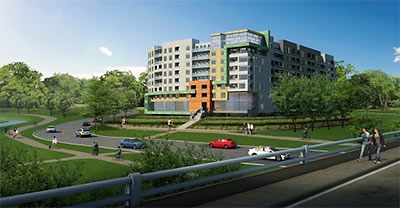That’s the message I get from this story about one developer who is trying to not piss off the people who live near his proposed development.
Oak trees along the sidewalks? Check. A push to build a dog park? Check. Parking garage barriers to shield neighbors from late-night headlights? Check.
These are just a few examples of the assurances one large apartment developer is making to residents of the neighborhood it plans to build in next.
The project in question is an eight-story, 276-unit apartment complex that will replace the aging Skylane Apartments at the entrance of the Woodland Heights neighborhood near downtown. Although some residents are glad to see the weatherworn complex go, others have raised concerns over how the new, higher-density project will affect traffic, green space and parking.
The deal is expected to close next month, but Charleston, S.C.-based Greystar has already made an effort to work with neighbors and hear their concerns.
Minutes from a recent meeting between the developer and the local civic association shed light on the nitty-gritty negotiations that can mean the difference between a peaceful project and one that leads to lengthy and expensive court battles. As pent-up demand for residential projects inside Loop 610 increases tensions in neighborhoods across Houston, some developers are learning that it’s better to work with, rather than against or around, the folks who already live there.
“More and more you see developers devoting more time and energy into proactively addressing neighborhood concerns,” said John Walsh, director of the graduate real estate program at the University of Houston.
Historically, Walsh said in an email, developers rarely made neighborhood concerns a priority.
See here for the background. This is the only example of a developer doing this sort of thing cited in the story, so it’s a bit of a stretch to call it a trend. Be that as it may, you’d think this would be good business practice for someone wanting to build highrise/multi-unit properties in areas that aren’t known for them. It’s true that there’s basically nothing a neighborhood can do to stop development they don’t like, though they can lobby against variances, but they can slow things down and generally make themselves a pain in the rear end. They may also generate enough negative publicity and ill will to affect the ultimate sales of the units being built, though that hypothesis of mine is as yet unproven. But really, what’s the downside to a developer to talk to the neighbors and hear their concerns before plowing ahead? You might get some useful feedback, and you’re surely save yourself some headaches. I don’t know why more developers wouldn’t take that approach. Swamplot has more.


The developer is running a cost benefit analysis. He’s going to tabulate what his extra costs are going to be to placate the existing neighbors, vs. what he thinks they will cost him by pissing and moaning to any governmental agency they think can hurt the developer and his plans. I agree, that’s a smart thing to do.
Some folks will be placated just by the act of the developer reaching out to them, as in “oh, you are important and your opinion matters.” (They aren’t really important, and no one really cares what their opinion is, actually.) Others will be placated by knowing they cost the developer extra money. Then there are those that simply will not be placated. Ashby high rise comes to mind. Those well to do neighbors know they are going to get the high rise, they are just willing to spend the money to go scorched earth, and cost the developer as much as they can. Personally, I’m happy to see those Ashby high rise neighbors find out that all their money can’t save them from the project. The well heeled who moved into gentrifying areas like the Heights didn’t care about pushing out the existing poor who did live there, so I think it’s somewhat satisfying to see a well off community experience some pain, too.